|
|
|
|
|
|
|
|
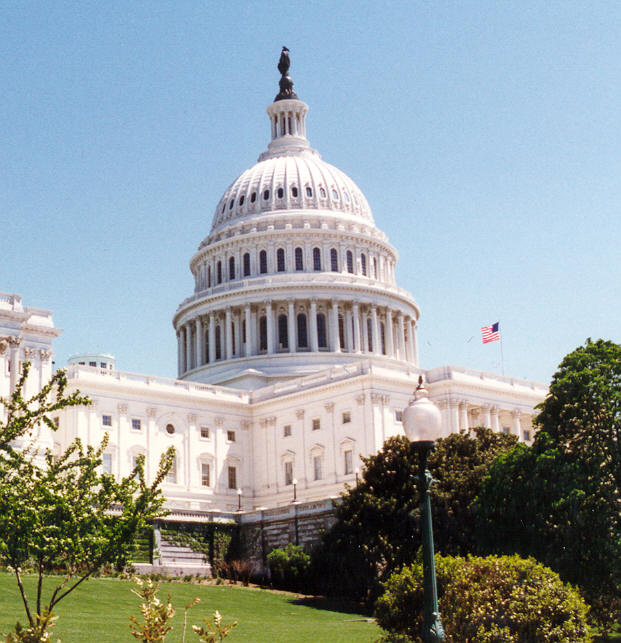 Today's Congressional Action: Today's Congressional Action:
The House and Senate are in session and not expected to consider Arctic legislation.
|
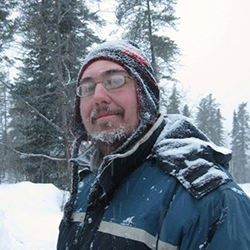 Arctic Kickstarter. Zac Hamilla, founder of the Arctic Studio (here) has initiated a Kickstarter project (here) titled, "The Arctic in U.S. National Identity." The project will result in a freely available research report on the nature and geography of U.S. Arctic identity and public consciousness. The Arctic Studio is a research organization focused on improving the quality of decision-making in political, economic, and security issues in the Arctic. Hamilla previously created the U.S. Navy's national Arctic intelligence analysis program and served as Principal Analyst for the Arctic at the U.S. Office of Naval Intelligence from 2009 to 2014." 97% funded...only $40 needed to reach original goal. Arctic Kickstarter. Zac Hamilla, founder of the Arctic Studio (here) has initiated a Kickstarter project (here) titled, "The Arctic in U.S. National Identity." The project will result in a freely available research report on the nature and geography of U.S. Arctic identity and public consciousness. The Arctic Studio is a research organization focused on improving the quality of decision-making in political, economic, and security issues in the Arctic. Hamilla previously created the U.S. Navy's national Arctic intelligence analysis program and served as Principal Analyst for the Arctic at the U.S. Office of Naval Intelligence from 2009 to 2014." 97% funded...only $40 needed to reach original goal.
Russia, Norway Polar Bear Count Nixed. Russian scientists are disappointed that a planned Norwegian-Russian polar bear inventory was canceled because of lack of good will from Russian authorities. As BarentsObserver reported, a long-planned joint mission to count the number of polar bears between Svalbard and Franz Josef Land had to be canceled because the Norwegian researchers were not allowed to enter Franz Josef Land. Alaska Dispatch News
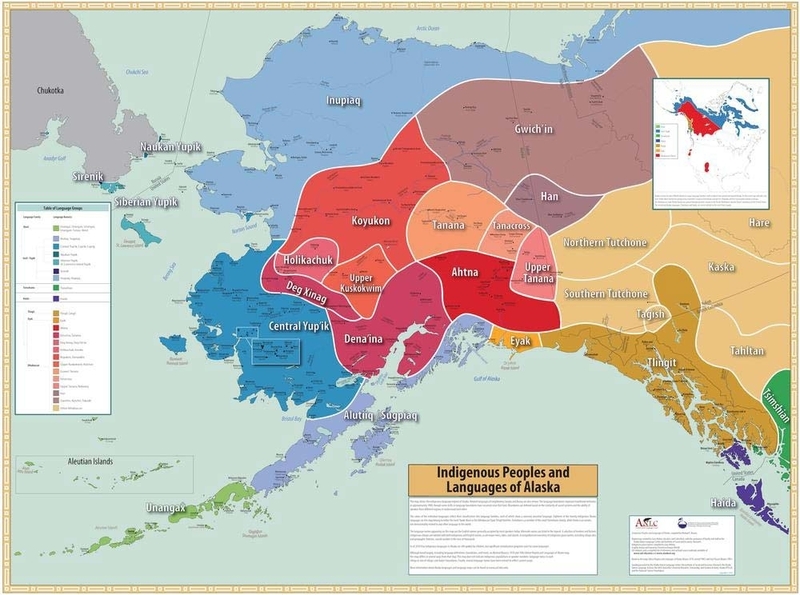 State to Provide Language Assistance to Yup'ik Gwich'in Voters. In a historic settlement, the state has agreed to provide increased language assistance for voters who speak Yup'ik and Gwich'in. The federal lawsuit was filed in 2013 by two Alaska Native voters and several tribal governments. The plaintiffs claimed the state doesn't do enough to serve voters who speak Alaska Native languages. Natalie Landreth with the Native American Rights Fund is an attorney for the plaintiffs. "The choices that were made in the settlement open the door for Alaska Native access to the polls in a way that we have not seen before." Alaska Public Radio State to Provide Language Assistance to Yup'ik Gwich'in Voters. In a historic settlement, the state has agreed to provide increased language assistance for voters who speak Yup'ik and Gwich'in. The federal lawsuit was filed in 2013 by two Alaska Native voters and several tribal governments. The plaintiffs claimed the state doesn't do enough to serve voters who speak Alaska Native languages. Natalie Landreth with the Native American Rights Fund is an attorney for the plaintiffs. "The choices that were made in the settlement open the door for Alaska Native access to the polls in a way that we have not seen before." Alaska Public Radio
Denali Commission Ekes Back Into the Spotlight. After being on life support for the past few funding cycles, The Denali Commission is full of muscle again with an expanded mission to help rural Alaska. The Commission, created by the late Senator Ted Stevens to fund village energy projects saw yearly funding up to $150 million at its peak. Currently the Commission's budget is around $10 million, but a mandate by the White House to help combat the effects of climate change on remote communities may help it garner more federal dollars. Joel Niemeyer is the federal co-chair of the commission. Alaska Public Radio
Russian Scientists Discover Two Ancient Arctic Continents. Amusingly, Arctida was formed, but then disintegrated around 750 million years ago. But after 500 million years the continent came together again, scientists from Russia's Novosibirsk State University (NSU) have discovered. Sputnik News
~ 35,000 Pacific walrus came ashore last week on Alaska's remote northwestcoast, the U.S. Fish and Wildlife Service announced Thursday, a September phenomenon tied to shrinking sea ice brought on by climate warming. ADN
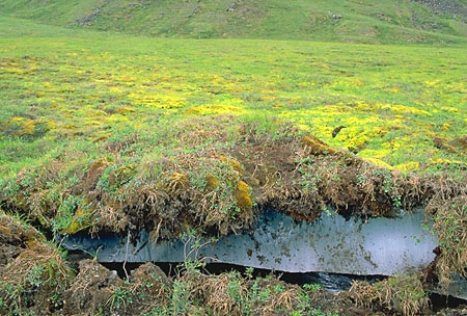 Climate, Not Russia, the Real Arctic Threat. I'm amazed at Sen. John McCain's inability to understand that the real dangers facing the U.S. are the forces causing the melting of Arctic ice, which are far more threatening than Vladimir Putin's theatrical posturing ("The Real Arctic Threat," op-ed, Sept. 2). Sen. McCain's failure to extrapolate from the current melting to the dangers of extreme climate change, for which no other threat compares, underscores that he is utterly unprepared for the new world we are in. Climate change is the result of past accumulations and increasing CO2 emissions. Wall Street Journal Climate, Not Russia, the Real Arctic Threat. I'm amazed at Sen. John McCain's inability to understand that the real dangers facing the U.S. are the forces causing the melting of Arctic ice, which are far more threatening than Vladimir Putin's theatrical posturing ("The Real Arctic Threat," op-ed, Sept. 2). Sen. McCain's failure to extrapolate from the current melting to the dangers of extreme climate change, for which no other threat compares, underscores that he is utterly unprepared for the new world we are in. Climate change is the result of past accumulations and increasing CO2 emissions. Wall Street Journal
Arctic UAS Research Challenges Boundaries of Autonomous Fight. Engineers on a German research icebreaker have programmed a multicopter to measure ice drift direction and speed in the Arctic Ocean. Engineers on board the Polarstern, the Alfred Wegener Institute's icebreaker, have programmed a multicopter which can navigate despite the deviation produced by the Earth's magnetic field near the North Pole. The researchers, who are part of the Alfred Wegener Institute's deep sea team, recently had success with an autonomous site, landing the multi-copter on an ice floe. Autonomous navigation is challenging at high latitudes, said Sascha Lehmenhecker, a researcher at the Alfred Wegener-Institute Center for Polar and Marine Research. Near the poles, the lines of the Earth's magnetic field are nearly perpendicular to the ground which makes precise navigation difficult, Lehmenhecker said. UAS Magazine
|
|
Legislative Action
No Arctic legislation was formally considered yesterday.
|
|
Future Events
CSIS. Arctic Transformation: Understanding Arctic Research and the Vital 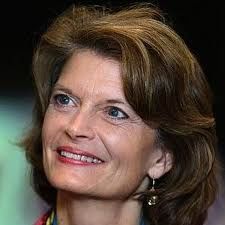 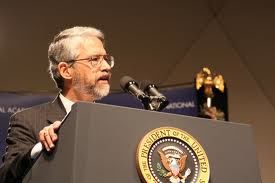 Role of Science, September 16, 2015, 8:30 am to 12:30 pm, Washington, DC Role of Science, September 16, 2015, 8:30 am to 12:30 pm, Washington, DC. Co-organized by the Senate Arctic Caucus and the Center for Strategic and International Studies (CSIS). Featuring opening remarks by Senators Lisa Murkowski (R-AK) and Angus King (I-ME). With a keynote address by Dr. John Holdren, Chair, Arctic Executive Steering Committee, Director of OSTP, The White House. Panelists include Larry Hinzman, Richard Glenn, George Roe, Paul Mayewski, Martin Jeffries, Kelly Falkner, John Farrell, and Cathy Cahill. CSIS's Senior VP, Heather Conley, will moderate.
Eighth Polar Law Symposium Alaska 2015, September 23-26, 2015 (Fairbanks and Anchorage, Alaska , USA). The Eighth Polar Law Symposium is co-hosted by Alaska Pacific University (APU), the University of Alaska Fairbanks, the University of Alaska Anchorage (through its Justice Center and its Institute of Social and Economic Research), the University of Washington School of Law, and Vermont Law School, in cooperation with the Arctic Law Section of the Alaska Bar Association. The symposium will be held on both campuses of the University of Alaska. The 2015 theme is: The Science, Scholarship, and Practice of Polar Law: Strengthening Arctic Peoples and Places.
2015 Arctic Energy Summit, September 28-30, 2015 (Fairbanks, Alaska, USA). The Institute of the North's 2015 Arctic Energy Summit builds on our legacy efforts to address energy as a fundamental element of the sustainable development of the Arctic as a lasting frontier.Central to this concept is a focus on providing pathways for affordable energy development in the Arctic and for Arctic communities.
The Arctic Circle is the largest global gathering on the Arctic. It is attended by heads of state and governments, ministers, members of parliament, officials, experts, scientists, entrepreneurs, business leaders, indigenous representatives, environmentalists, students, activists, and others from the growing international community of partners and participants interested in the future of the Arctic. The Arctic Circle highlights issues and concerns, programs, policies and projects; it provides platforms for dynamic dialogue and constructive cooperation. While the plenary sessions are the responsibility of the Arctic Circle, the breakout sessions are organized by various participating partners in their own name and with full authority over the agenda and the choice of speakers.
2015 Arctic Science Conference, October 1-3, 2015 (Anchorage, Alaska, USA). The conference theme is "Healthy Estuaries: Sustainability and Resilience." Conference topics include traditional scientific disciplines, science education, arctic social sciences, biomedical research, and artistic interpretation of the evolving North. Abstract submissions are now being accepted. The deadline is August 1, 2015.
The Polar Oceans and Global Climate Change, November 3-6, 2015 (La Jolla, California USA). The American Polar Society will host this Symposium at Scripps Institution of Oceanography. A flyer with a partial list of presenters is available on the Society's website (americanpolar.org) and from the Society's Membership Chairman by email.
Forum for Arctic Modeling and Observational Synthesis Meeting, November 3-6, 2015 (Cape Cod, MA, USA). On November 3rd, the 2015 School for young scientists will consider "Regional Oceanography of the Arctic marginal seas" with lectures covering major features of atmospheric, sea ice and oceanographic regimes of the: Bering, Chukchi, Beaufort, East-Siberian, Laptev Sea, Kara, Barents and Nordic seas. On November 4-6, the meeting portion will summarize project accomplishments for the last 3 years of activities and will focus on the formulation of scientific questions and directions for FAMOS future research (2016-2019) to: (a) improve Arctic modeling, employing very high resolution models; (b) develop and test new arctic monitoring/observing systems and (c) improve predictions of Arctic environmental parameters with reduced uncertainties.
Due North: Next Generation Arctic Research & Leadership, November 5-8, 2015 (Calgary, Alberta, Canada). The Association of Canadian Universities for Northern Studies (ACUNS) will convene an interdisciplinary conference of early career scientists working on Arctic issues. Topics will include: Arctic Communities, Arctic Sustainable Development, Arctic Wildlife, Ecosystem and Biodiversity, Arctic Food Security, Arctic Landscapes, Climate Change and Adaptation, Disaster Risk Management, Policy, Politics and Leadership, Arctic Environment (Data and Techniques), Arctic Resources, and Future of Arctic.
Arctic Observing Open Science Meeting, November 17-19, 2015 (Seattle, Washington). The Arctic Observing Open Science Meeting will be 2.5 days and held at the Hyatt at Olive 8 in Seattle, Washington. The conference will bring together individuals and teams involved in the collection, processing, analysis, and use of observations in the Arctic - from academia, agencies, industry, and other organizations. The meeting will be convened as a combination of plenary talks, parallel science sessions, and a poster session. The agenda and registration information will be forthcoming.
In the Spirit of the Rovaniemi Process 2015, November 24-26, 2015 (Rovaniemi, Lapland, Finland).When the Arctic Environmental Protection Strategy, the so-called Rovaniemi Process, was adopted in 1991, it aimed at overcoming divisions and turning the zone of Cold War military tensions into a region of peace and co-operation. In this joint effort focusing on the protection of environment, and later, sustainable development, the Arctic states supported by indigenous organizations laid grounds for institutionalized collaboration and the emergence of Arctic regional identity. The second international conference will bring together decision-makers, scholars, artists, designers and students to address these questions and discuss the Arctic in global, regional and local perspectives.
Arctic Encounter Paris (AEP 2015), December 11-12, 2015 (Paris, France) (During the UN Convention on Climate Change - COP21). The Arctic Encounter Paris will take place at the French Senate at Luxembourg Palace and the French Military College, École Militaire, in Paris, France, on the final days of the monumental United Nations Convention on Climate Change (COP 21) where thousands of global citizens and government delegates will be gathered to deliberate the world's response to our changing planet in Paris. The AEP is the only Arctic policy side event current planned to take place during the UN Convention. A cocktail reception will take place following the closing panel.
3rd Annual Arctic Encounter Symposium (AES 2016), January 15-16, 2016 (Seattle, WA, USA). Building upon the preceding Arctic Encounter event in Paris, the third annual Arctic Encounter Symposium (AES) in Seattle, Washington will convene policymakers, industry leaders, and leading experts to confront the leading issues in Arctic policy, innovation, and development. As the largest annual Arctic policy event in the United States, the AES mission is to raise awareness, engage challenges, and develop solutions for the future of a region and a people. The two-day program includes two keynote luncheons, expert plenary sessions, break out sessions, a networking cocktail reception and seated dinner. A closing reception will take place at the conclusion of the program. The third annual AES at the University of Washington with a dinner reception at the Museum of History and Industry on South Lake Union, Seattle.
|
|

  
4350 N. Fairfax Drive, Suite 510
Arlington, VA 22203, USA
External links in this publication, and on the USARC's World Wide Web site ( www.arctic.gov) do not constitute endorsement by the US Arctic Research Commission of external Web sites or the information, products or services contained therein. For other than authorized activities, the USARC does not exercise any editorial control over the information you may find at these locations. These links are provided consistent with the stated purpose of this newsletter and the USARC Web site.
|
|
|
|
|
|
|
|
|